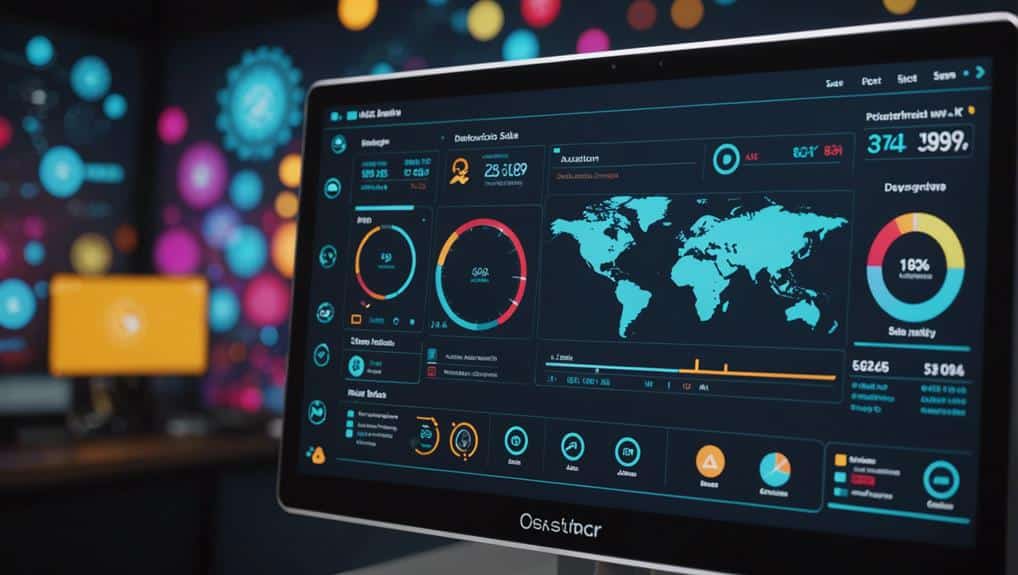Done for You Sales Automation helps make sales more accessible and innovative in today’s busy world. It uses tools like CRM systems, email automation, and AI to handle tasks such as finding new leads, following up with customers, and making reports. These tools save time, with automated lead scoring freeing up to 30% of sales reps’ time. They also make predictions more accurate, improving decision-making by 14.5%. These tools allow businesses to manage data better, forecast sales accurately, and interact with customers smoothly.
Businesses using Done for You Sales Automation can significantly improve their sales processes and focus on essential tasks that help them grow. This approach ensures that all sales activities are efficient and based on good data. Companies can work smarter and achieve better results with advanced tools and techniques. Sales teams can spend more time on activities that add the most value, leading to tremendous success and growth.
Streamline Sales with Launched Done for You AutomationKey Takeaways
- Integrate CRM systems like Salesforce for seamless lead management and enhanced customer relationships.
- Utilize AI-powered tools for predictive analytics to improve lead conversion rates and data-driven decision-making.
- Automate repetitive tasks such as data entry and follow-ups to boost sales reps’ productivity by up to 30%.
- Employ email automation platforms like Mailchimp for personalized and targeted marketing campaigns.
- Implement robust data management strategies with secure storage and advanced analysis for revenue growth and precise forecasting.
What Is Sales Automation?
Sales automation, a pivotal element of modern sales strategies, leverages technology to streamline and automate various sales processes, enhancing efficiency and productivity. It involves using sophisticated tools to manage and optimize tasks such as lead generation, prospecting, lead nurturing, follow-ups, and reporting.
Automating these repetitive tasks empowers sales teams to focus on high-value activities like selling and building relationships, which are essential for driving revenue growth.
The right sales automation tools help organizations to scale their operations effectively. These tools use data-driven insights to guide sales teams through each process step, ensuring that customer interactions are timely and relevant. This strategic approach reduces manual effort and improves accuracy and consistency in sales activities.
Businesses can significantly enhance their productivity by leveraging automation and aligning their sales efforts with broader organizational goals.
Furthermore, sales automation provides a thorough guide for managing customer relationships. By automating routine tasks, sales representatives can devote more time to understanding customer needs and preferences, delivering personalized and impactful interactions. This ultimately leads to higher customer satisfaction and loyalty, fostering long-term business growth.
Benefits of Sales Automation
Sales automation greatly enhances productivity by streamlining repetitive tasks, allowing sales teams to concentrate on closing deals and strategic activities. These solutions facilitate a more efficient and effective sales process by optimizing lead management and ensuring a consistent flow of qualified prospects.
Moreover, automation tools provide precise forecasting and reporting capabilities, enabling data-driven decision-making and improved overall performance.
Increased Productivity
Harnessing sales automation can significantly boost productivity by streamlining processes and minimizing manual tasks, leading to a 14.5% increase in efficiency. By leveraging automated lead scoring, sales reps can prioritize high-value prospects, saving valuable time and focusing on closing deals. This enhances productivity and guarantees that each action is data-driven and strategic.
Incorporating sales automation into your workflow offers several tangible benefits:
- Automated Lead Scoring: Helps identify and prioritize high-value prospects, enabling sales reps to focus on leads most likely to convert.
- Time Savings: Automation allows sales reps to save up to 30% of their time, which can be redirected towards closing more deals.
- Improved Data Accuracy: Automation reduces the risk of errors, ensuring that decisions are based on reliable and accurate data.
- Reduction in Manual Tasks: Tasks like email follow-ups and lead nurturing are automated, freeing up time for more strategic sales activities.
- Enhanced Decision-Making: Sales teams can make more informed and effective decisions with accurate data and streamlined processes.
Streamlined Processes
Implementing sales automation technologies can significantly streamline processes by automating repetitive tasks such as data entry, email follow-ups, and lead nurturing. This not only leads to improved productivity but also provides significant time-saving benefits for sales teams. Tools like Pipedrive, PandaDoc, and Zapier enable efficient task management by automating workflows and managing leads.
Sales automation guarantees consistent forecasting and reporting, offering up-to-the-minute insights that enhance strategic decision-making. These technologies improve customer relationships through tailored communication by reducing manual errors and streamlining sales. Consequently, sales professionals can focus more on high-value activities than mundane ones.
| Benefit | Description | Tool Examples |
|---|---|---|
| Time-Saving Benefits | Automate repetitive tasks to free up time for strategic activities | Pipedrive, Zapier |
| Improved Productivity | Focus on high-value tasks, thereby boosting overall performance | PandaDoc, Pipedrive |
| Efficient Task Management | Streamline sales operations and minimize human errors | Pipedrive, Zapier |
| Enhanced Customer Relationships | Foster tailored communication, thus improving customer satisfaction and loyalty. | PandaDoc, Pipedrive |
Embracing sales automation streamlines processes and equips sales teams with the tools for consistent forecasting. The result is a more agile, efficient, and responsive sales force capable of driving significant business growth.
Why Done for You Sales Automation is So Powerful
Done for You Sales Automation is powerful because it brings expertise and advanced tools to your sales process. Many sales automation tools are complicated and require technical knowledge to use fully. Our team has decades of experience in sales, marketing, and technology. We handle these tools’ setup, monitoring, and updates, so you don’t have to worry about the technical stuff.
With Done for You Sales Automation, your business can focus more on managing and growing. We keep up with the latest technology and make changes as needed. This means your sales team can concentrate on closing deals with interested customers. You get more time and better tools to run your business smoothly and efficiently.
Essential Sales Automation Tools

In modern sales operations, CRM systems like Salesforce are pivotal in lead management and automation, driving efficiency and productivity. These systems streamline workflows and provide a centralized hub for tracking customer interactions and sales data.
Complementing CRM systems, email automation platforms like Mailchimp enable targeted campaigns, ensuring tailored communication at scale.
Sales engagement platforms such as outreach enhance these efforts by automating follow-ups and managing communication schedules, essential for maintaining consistent outreach engagement. Additionally, sales intelligence tools like ZoomInfo deliver actionable insights, empowering sales teams to tailor their outreach strategies based on up-to-date data.
Essential tools that further enhance automation efficiency include:
- Proposal generation tools like simplify contract creation and e-signature collection.
- Analytics tools offer deep insights into sales performance, aiding data-driven decision-making.
- Integration platforms like Zapier guarantee seamless connectivity between disparate sales tools.
- AI-powered chatbots Handle real-time customer queries, enhancing engagement and support.
- Sales intelligence tools offer detailed data to personalize and optimize outreach efforts.
Leveraging these tools strategically optimizes sales operations and empowers sales teams to focus on high-value activities, fostering a culture of freedom and innovation.
Lead Generation Automation
They are building upon the efficiency enhanced by necessary sales automation tools, lead generation automation streamlines identifying and attracting potential customers through data-driven strategies and targeted outreach. By integrating automation tools such as LinkedIn Sales Navigator, Expandi, and Phantombuster, businesses can reach and engage prospects, ensuring a robust sales pipeline.
These automation tools facilitate a multi-faceted approach to lead generation, incorporating email campaigns, social media outreach, and content marketing. LinkedIn Sales Navigator identifies key decision-makers, Expandi automates LinkedIn outreach to scale connections, and Phantombuster extracts essential data from various platforms to enhance targeting accuracy. This all-encompassing strategy ensures a continuous influx of qualified leads, optimizing the efficiency of sales teams.
Moreover, integrating personalization tools like Hyperise further refines lead generation efforts. Tailored messages and content resonate more deeply with prospects, increasing engagement rates and the likelihood of conversion. Businesses can maintain consistent outreach and follow-up by automating these processes, freeing valuable time for sales teams to focus on closing deals.
Customer Data Management

EffectiveOutreachr data management is pivotal in sales automation. It encompasses data collection strategies, secure data storage, and advanced data analysis techniques. Businesses can systematically gather and protect customer information by leveraging robust CRM systems. They can also utilize analytical tools to extract actionable insights. This approach enhances targeted marketing efforts, optimizes sales strategies, and drives revenue growth.
Data Collection Strategies
Implementing robust data collection strategies is essential for gathering detailed customer information, such as demographics, preferences, and purchase history. These strategies empower businesses to harness customer data management effectively, utilizing CRM systems to centralize data, which enhances data tracking and segmentation.
Understanding customer behavior through precise data collection enables tailored sales approaches, improving sales efficiency and fostering strong customer relationships.
To paint a clear picture, consider the following:
- CRM Systems: Centralize and manage customer data for streamlined tracking and segmentation.
- Behavioral Analysis: Use collected data to analyze customer behavior, aiding in tailored sales efforts.
- Automated Surveys: Implement automated surveys to gather customer feedback and preferences consistently.
- Purchase History Tracking: Monitor purchase history to identify patterns and enhance targeted marketing campaigns.
- Segmentation Techniques: Apply data segmentation to create personalized marketing strategies for different customer groups.
Strategic data collection is the cornerstone of effective customer data management. It drives targeted marketing campaigns that resonate with specific customer segments. It allows businesses the freedom to optimize sales processes, ensuring that detailed, up-to-date data inform every interaction.
Secure Data Storage
Protecting sensitive client information gathered through robust data collection strategies requires implementing secure data storage solutions. Safeguarding sensitive customer data is crucial in end-to-end sales automation. Adhering to data privacy regulations like GDPR and CCPA is not just a compliance necessity but a strategic imperative.
Employing advanced encryption protocols and stringent access controls fortifies customer information against unauthorized access and cyber threats. These measures are essential for maintaining the integrity and confidentiality of data. Secure cloud storage options offer the dual benefits of scalability and accessibility without compromising security, making them ideal for dynamic business environments.
Furthermore, regular data backups and thorough disaster recovery plans are essential to a robust data storage strategy. These elements ensure that data loss is mitigated and business continuity is maintained, even in unforeseen disruptions.
Integrating these secure data storage solutions into your sales automation framework strategically enhances data protection and fosters customer trust. By demonstrating a commitment to data privacy and security, businesses can achieve a competitive edge while empowering themselves with the freedom to innovate and grow.
Data Analysis Techniques
Robust customer data management hinges on the systematic collection, organization, and sophisticated analysis of customer information to drive targeted sales strategies. Effective data analysis techniques are vital in deciphering customer behaviors, preferences, and needs, ultimately empowering businesses to tailor their sales approaches.
Leveraging customer relationship management (CRM) tools allows for meticulous tracking and organizing of customer data, thereby facilitating individualized interactions.
A strategic approach to customer data management involves several key elements:
- Segmentation: Dividing customers into unique groups based on various criteria enables targeted marketing campaigns and personalized sales pitches.
- Historical Sales Data: Analyzing past sales can uncover patterns, aiding in forecasting and trend identification, which are crucial for strategic decision-making.
- Customer Behaviors: Understanding how customers interact with products and services helps craft strategies that resonate with their preferences and needs.
- Forecasting: Predictive analytics can anticipate future sales trends, allowing businesses to adjust their strategies proactively.
- Trend Identification: Recognizing emerging trends enables companies to stay ahead of the market and meet evolving customer demands effectively.
Automated Sales Reporting
Automated sales reporting leverages up-to-the-minute data and analytics to deliver precise insights into sales performance metrics, greatly enhancing the accuracy and efficiency of reporting processes. Organizations can eliminate manual data entry errors by utilizing advanced sales automation tools such as Salesforce and HubSpot, ensuring consistent and accurate reporting. These tools provide personalized reporting dashboards that offer up-to-date insights and in-depth analytics, facilitating a streamlined sales process.
The integration of automated sales reporting empowers sales teams to make data-driven decisions, optimizing their strategies based on concrete evidence rather than intuition. This capability is invaluable for sales managers; they can effortlessly track sales activities, monitor pipeline progress, and generate accurate revenue forecasts. Accessing up-to-date insights means that adjustments can be made on the fly, ensuring that the sales process remains agile and responsive to market changes.
Furthermore, the personalized reporting dashboards enable sales managers to tailor reports to their needs, focusing on key performance indicators that drive business success. This strategic approach boosts operational efficiency and provides the freedom to innovate and adapt, driving long-term growth and profitability.
Email and Call Automation

How can sales teams harness the power of email and call automation tools to enhance their productivity and lead conversion rates powerfully?
By leveraging email automation and call automation tools, sales teams can streamline their workflows, considerably boosting efficiency and effectiveness. Email automation platforms like Woodpecker and AutoKlose can increase response rates by up to 70%, providing a robust mechanism for customized email sequences and effective lead nurturing. By automating repetitive tasks, these tools not only save time but also reduce manual errors, allowing sales teams to focus on high-value activities.
Call automation tools such as Invoca and CallTrackingMetrics serve a dual purpose. They automate call tracking and attribute revenue to specific marketing campaigns, providing detailed data insights. This enables well-informed decision-making, ensuring sales efforts align optimally with business goals.
Consider the following benefits of integrating email and call automation tools:
- Enhanced Response Rates: Automated email campaigns can improve response rates by up to 70%.
- Revenue Attribution: Call automation links revenue to specific marketing efforts.
- Time Savings: Reducing repetitive tasks frees up valuable time for strategic activities.
- Error Reduction: Automation minimizes manual errors.
- Data-Driven Decisions: Detailed data insights support well-informed decision-making.
AI in Sales Automation
Expanding on the efficiencies gained through email and call automation, the integration of AI in sales automation introduces sophisticated machine learning algorithms that analyze customer data to predict future behaviors and enhance lead conversion rates. By leveraging customer data analysis, AI provides exceptional insights into customer preferences and buying patterns, enabling businesses to implement highly effective personalized assistance.
AI-driven sales forecasting empowers organizations to make data-driven decisions and accurately predict sales trends. By automating lead scoring, AI ensures that sales teams can prioritize high-value leads, thereby optimizing resource allocation and maximizing conversion potential.
Moreover, AI greatly enhances customer segmentation, allowing for more precise, targeted marketing strategies and personalized communication.
The deployment of AI-powered chatbots facilitates real-time customer engagement, offering tailored responses and improving the overall user experience. This real-time personalized assistance boosts customer satisfaction and fosters stronger customer relationships.
Essentially, AI in sales automation streamlines operations and strategically positions businesses to respond dynamically to market demands and customer needs, ensuring long-term growth and competitive advantage.
Choosing the Right Tools

Choosing the right sales automation tools requires thoroughly assessing their integration capabilities with existing systems and workflows. This guarantees seamless operation and maximizes the tool’s utility within your sales ecosystem.
A strategic evaluation of these tools also involves analyzing their scalability and customization options, essential for accommodating business growth and specific requirements.
When selecting sales automation tools, consider the following critical aspects:
- Integration Capabilities: Ensure the tool integrates smoothly with your existing CRM, ERP, and sales-related systems.
- Scalability: Opt for solutions that can grow with your business, handling increased data volume and complexity without compromising performance.
- Customization Options: Choose tools that tailor features and workflows to fit business needs and processes.
- Advanced Analytics: Look for tools with robust analytics and reporting features to facilitate thorough performance tracking and informed decision-making.
- Intuitive Interfaces: Prioritize tools with user-friendly and easy-to-navigate interfaces to promote user adoption and efficiency.
Additionally, secure data handling and compliance with data protection regulations are paramount. Tools should offer robust security measures to protect sensitive sales data and ensure compliance with industry standards.
Frequently Asked Questions
How to Automate Your Sales Process?
Leverage AI-powered tools for lead generation, qualification, and nurturing to automate your sales process. Implement automated follow-up sequences, deal management, and reporting, ensuring seamless workflow and enhanced sales efficiency through end-to-end automation solutions.
How can Done for You Sales Automation help your sales team focus on closing deals?
Done for You Sales Automation handles the day-to-day hard work with your approval, allowing your sales team to focus on closing deals with qualified and interested customers. This ensures sales reps spend more time on high-value activities that drive growth.
What Are Sales Automation Tools?
Sales automation tools are software systems designed to automate repetitive sales tasks, such as lead generation, email outreach, and data entry. These tools enhance workflow efficiency, enabling sales teams to focus on relationship-building and revenue generation.
How to Automate Prospecting?
Leverage tools like Expandi for LinkedIn outreach to automate prospecting, implement lead scoring for prioritization, utilize customized follow-up automation tools, and incorporate hyper-individualization tactics with Hyperise. Consistent, data-driven follow-ups enhance engagement and conversion rates.
How to Use Automation in CRM?
To effectively use automation in CRM, implement workflows for lead management, contact segmentation, and communication. Automate data entry, task assignments, and follow-ups to enhance efficiency, reduce errors, and enable sales teams to prioritize relationship-building and closing deals.
Conclusion
In sum, sales automation is the linchpin for modern sales strategies, offering myriad benefits such as enhanced efficiency, precise data management, and robust reporting capabilities.
Integrating tools for lead generation, customer data management, and AI-driven automation can streamline processes and drive revenue growth for organizations.
Selecting appropriate tools requires a strategic approach grounded in data and business objectives.
Ultimately, sales automation transforms the sales landscape, akin to a well-oiled machine accelerating toward success.

Erik Remmel is a co-founder of Launched, a platform that helps businesses grow through AI-powered marketing, automation, and lead generation. He focuses on building scalable systems that convert cold leads into customers while streamlining operations with smart, AI-driven workflows.

